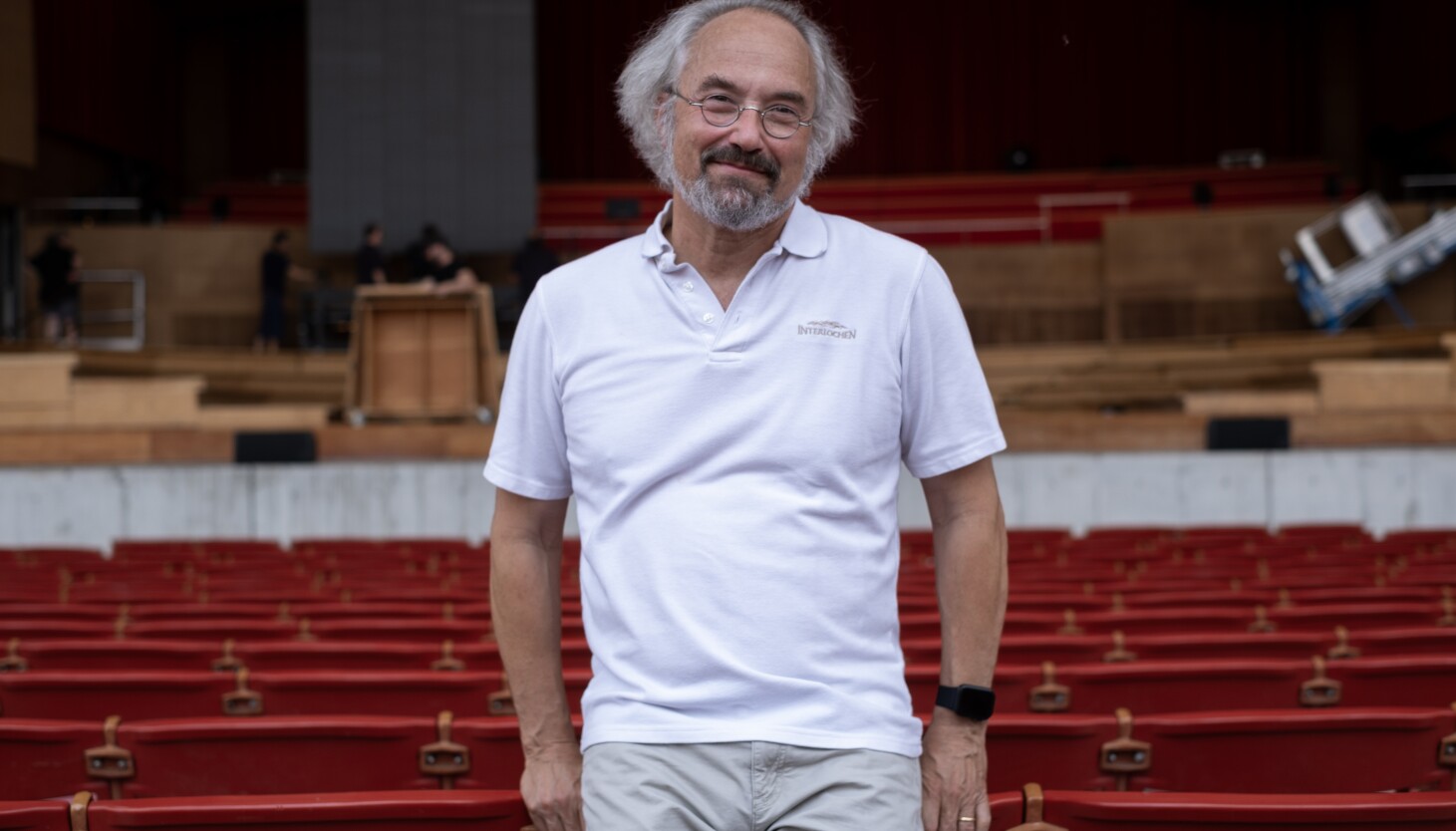Spurred by the always free-thinking conductor Leonard Slatkin, who served for two seasons as principal conductor in the 1970s, and others, the Grant Park Music Festival has long had a tradition of bold, adventuresome programming.
But none of the festival’s leaders have done more than Carlos Kalmar, who has made offsetting familiar classics with intriguing combinations of new and unusual works from the past a defining hallmark of his tenure.
“His open-mindedness and his bravery, in a way, not being afraid to program lesser-known and forgotten composers and to commission new works — I think this could be his legacy in the long run,” said internationally known violin soloist Vadim Gluzman, who has appeared four times at the festival in between 2008 and 2021.
Grant Park’s 2024 season, which runs through Aug. 17, will be Kalmar’s last as principal conductor and artistic director. He is stepping down after 25 seasons in the former position and 14 in the latter and will assume the title of conductor laureate.
Kalmar, 66, admitted that he could envision himself leading the festival for 50 years — a job that he called a “blessing.”
“There is nothing as fantastic as the Grant Park Music Festival,” he said. “It’s a sensational city. The setting is great. The orchestra and chorus are wonderful.”
At the same time, he said, average tenures in positions like his are 10 years, and he has been in his post for nearly a quarter-century.
“I thought, ‘Well, yes, of course, I can continue. But I can say I made my point. It’s a good time to give the reins to someone else.’”
“There are other festivals in the United States that are absolutely fantastic and great, but I doubt there is any festival of this magnitude, this output, this length and this amount of concerts that features such a variety of different programs.”
— Conductor Carlos Kalmar, praising the festival he has helmed for 25 years
The Grant Park Music Festival dates to 1935 when symphonic offerings in the park became an annual tradition. It now presents a free 10-week series each summer in Millennium Park showcasing the Grant Park Orchestra and Chorus and guest soloists from around the world.
After Kalmar announced that 2024 would be his final season following a contract extension, the festival established a search committee in late 2021 to find his replacement. It comprises six musicians as well as board and community representatives.
According to Paul Winberg, the Grant Park festival’s president and CEO, the committee crafted an initial list of 150 candidates based in part on recommendations from festival’s musicians and industry leaders, and then winnowed the list down. The search kicked into high gear last summer, with many guest-conducting appearances serving as auditions.
“We have several who are coming back this year,” Winberg said of the finalists.
Born in Uruguay to Jewish immigrants from Austria, Kalmar studied at the Vienna Academy of Music, and his early posts were in Europe. He later served as principal conductor of the Tonkünstler Orchestra in Vienna in 2000-2003 and music director of the Oregon Symphony in 2003-2021.
Kalmar arrived at the Grant Park festival in 2000, four years before the festival took a transformational leap forward. It moved from the rudimentary Petrillo Music Shell in Grant Park to Millennium Park’s Pritzker Pavilion, a sleek, sprawling amphitheater designed by renowned architect Frank Gehry.
The shift immediately attracted new audiences. Attendance for the festival in the last five years (excluding 2020 when the COVID-19 shutdown forced the cancellation of its concerts) ranged from a high of 223,500 in 2019 to a low for the 2021 shortened season of 138,300, with an average turnout per concert of 6,985.
In his new position, Kalmar had to quickly adjust to performing outside and dealing with inevitable ambient noises like ambulance sirens or passing planes, something that he had done little of previously in his career.
Pritzker Pavilion, with its high-tech sound system and more contained space, has made it easier to set aside such distractions, and, with very few exceptions, the conductor has felt free to present just about any work there.
“I would say I program regardless [of the noise],” he said of the outdoor environment.
Unless there is a rainstorm, Kalmar and his musical forces also rehearse outside on the Pritzker stage, and passersby are free to sit through the whole session or just listen for a few minutes. Docents speak during the break, turning these rehearsals into educational opportunities.
During his tenure, the conductor believes he has significantly elevated the level playing of the orchestra, which draws musicians from professional orchestras across the county. Much the same is true, he said, of the festival’s “world-class chorus,” which has been overseen and prepared by Christopher Bell since 2002.
“I’m an absolute fan of the human voice, and I love to work with the chorus,” Kalmar said.
The professional singers have long been an important part of Grant Park’s offerings, and Bell said the choral-minded Kalmar and he have had the “longest and arguably most productive relationship” in his working life. He particularly praised Kalmar’s 2019 take on Frederick Delius’ rarely heard “A Mass of Life,” in which Bell said he heard the merits of the piece like never before.
“I really don’t want to spend my time preparing a chorus for a conductor who at the end of the day doesn’t take what we’ve done and make something of it,” Bell said. “It would be shame.”
Gluzman, a Northbrook resident who serves as artistic director of the North Shore Chamber Music Festival, praised Kalmar’s his abilities on the podium, calling it “exhilarating” to collaborate with him.
“He does not phone it in, let’s put it that way,” the violinist said. “Again, it’s a kind of bravery. This is someone who has his own voice for the right reasons, not in order to be original or different.”
From his first summer in Chicago, Kalmar sought to give the festival a “distinctive artistic face,” setting it apart from what is happening at other venues in the city and beyond.
“There are other festivals in the United States that are absolutely fantastic and great,” he said, “but I doubt there is any festival of this magnitude, this output, this length and this amount of concerts that features such a variety of different programs.”
In terms of programming, he pointed to these accomplishments:
- He has continued and amplified the festival’s tradition of promoting American music, including 13 works by Samuel Barber as well as pieces by such composers as Aaron Copland, William Dawson, Roy Harris, Edward MacDowell, Walter Piston and William Schuman.
- The conductor has put an emphasis on women composers, as he put it, “before it became fashionable,” including selections by Amy Beach, Lili Boulanger, Augusta Holmes, Florence Price and Ellen Taaffe Zwilich. “I am always a firm believer that we need all the voices,” he said, “and there are plenty of voices who have been neglected over centuries in our classical-music world. Finally, we are getting to it, and the Grant Park Music Festival has done its part and I hope very much whoever takes the reins will continue down that route.”
- Under Kalmar’s leadership, the Grant Park Festival has presented 15 world premieres, including John Corigliano’s “Midsummer Fanfare” (2005), Stacy Garrop’s “Shiva Dances” (2019) and Christopher Theofanidis’ Flute Concerto (2022).
Grant Park has also presented scores of festival premieres under his leadership, including many works from the past that are almost never heard. Kalmar cited two oratorios in particular that stand out for him — “The Epic of Gilgamesh” (1954-55) by Czech composer Bohuslav Martinů and “The Book with Seven Seals” (1937) by German composer Franz Schmidt.
Kalmar, who lives in the Cleveland suburb of Shaker Heights, declined to talk about what might be in the future for him.
“There are a couple of things in the works,” he said, “but there is nothing concrete in terms of being a principal conductor or music director or something like that.”
According to the Cleveland Plain-Dealer, he filed a lawsuit in February against the Cleveland Institute of Music, where he was placed on leave last year from his position as director of its orchestral and conducting programs. He is seeking $25 million over alleged defamation from a sexual harassment investigation that cleared him of all wrongdoing. Kalmar declined to comment on the case.
Kalmar is leaving the Grant Park festival filled with what he called “a lot of pride.” To his successor, he offers this bit of advice: “Take it, run with it, and put your own stamp on it.”


!["War Requiem" conducted by Carlos Kalmar at the Grant Park Music Festival.]](https://cst.brightspotcdn.com/dims4/default/6272fba/2147483647/strip/true/crop/4256x2265+0+0/resize/840x447!/quality/90/?url=https%3A%2F%2Fchorus-production-cst-web.s3.us-east-1.amazonaws.com%2Fbrightspot%2Fb7%2F2b%2F93b177a3432a829b0bb5df05b60b%2Ffxbestclassical-cst-122713-72.jpg)


